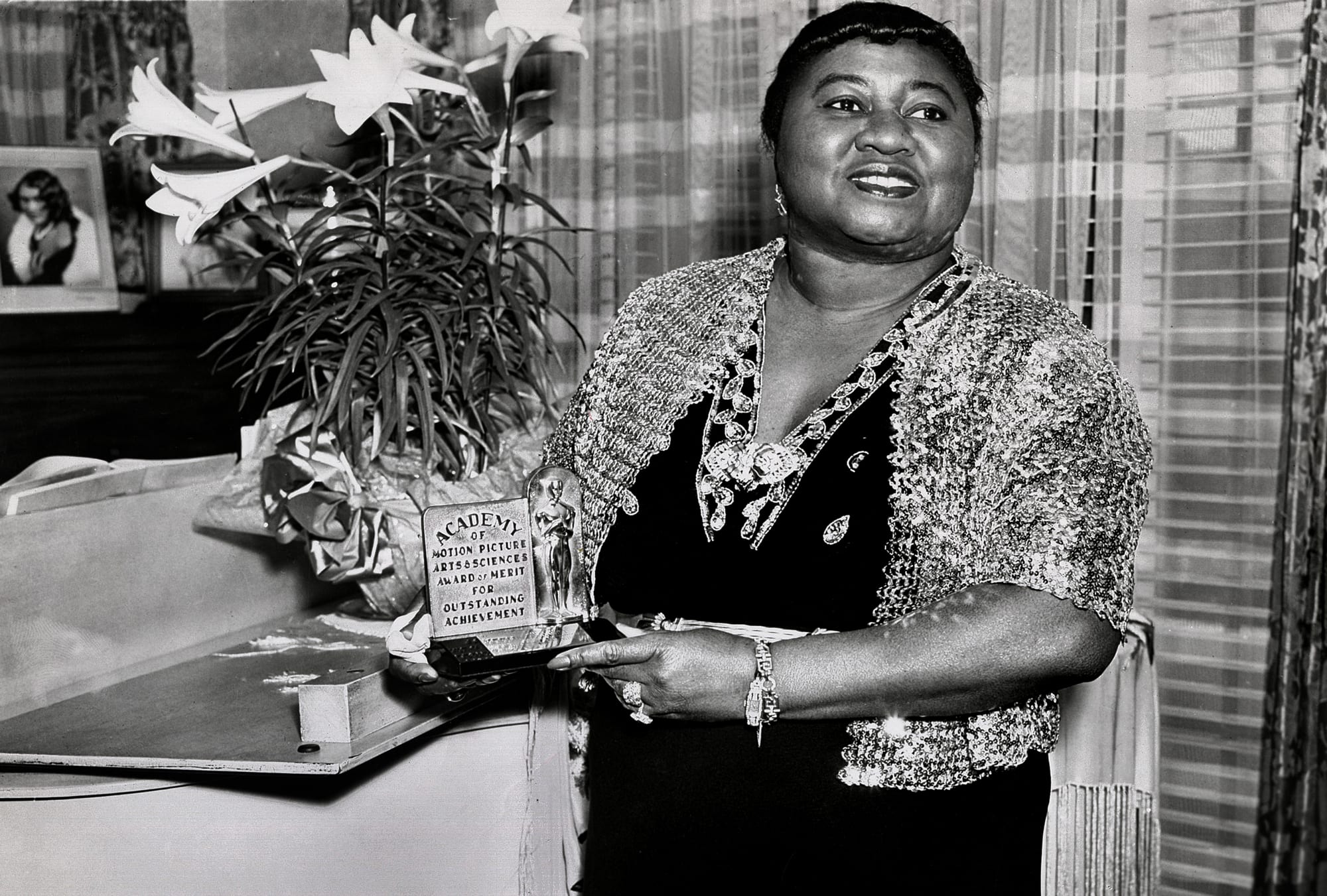
Who Was Hattie McDaniel?
By the mid-1920s, Hattie McDaniel became one of the first African American women to perform on radio. In 1934, she landed her on-screen break in the film Judge Priest. She then became the first African American to win an Oscar in 1940, for her role as Mammy in Gone with the Wind. In 1947, after her career took a downturn, she began starring on CBS radio’s The Beulah Show.
Early Years
McDaniel was born on June 10, 1893, in Wichita, Kansas, with some sources listing her year of birth as 1895. She was her parents’ 13th child. Her father, Henry, was a Civil War veteran who suffered greatly from war injuries and had a difficult time with manual labor. (Henry was later described by one of his sons as a minister, though this was a fictionalized account.) Her mother, Susan Holbert, was a domestic worker.
In 1901, McDaniel and her family moved to Denver, Colorado. There she attended the 24th Street Elementary School, where she was one of only two black students in her class. Her natural flair for singing—in church, at school, and in her home—was apparent early on and gained her popularity among her classmates.
While at East River High School, McDaniel started professionally singing, dancing and performing skits in shows as part of The Mighty Minstrels. In 1909, she decided to drop out of school in order to more fully focus on her fledgling career, performing with her older brother’s own troupe. In 1911, she married pianist Howard Hickman and went on to organize an all-women’s minstrel show.
In the 1920s, McDaniel worked with Professor George Morrison’s orchestra and toured with his and other vaudeville troops for several years. By mid-decade, she was invited to perform on Denver’s KOA radio station.
Following her radio performance, McDaniel continued to work the vaudeville circuit and established herself as a blues artist, writing her own work. When projects weren’t coming in, she took on attendant work to supplement her income. Much to her relief, in 1929 she landed a steady gig as a vocalist at Sam Pick’s Suburban Inn in Milwaukee.
Pursuing the Hollywood Dream
A year or so later, McDaniel’s brother, Sam, and sister, Etta, convinced her to move to Los Angeles, where they had managed to procure minor movie roles for themselves. Sam was also a regular on a KNX radio show called The Optimistic Do-Nuts. Not long after arriving in L.A., McDaniel had a chance to appear on her brother’s program. She was a quick hit with listeners and was dubbed “Hi Hat Hattie” for donning formal wear during her first KNX performance.
Hollywood Hits: ‘Judge Priest’ and ‘The Little Colonel’
McDaniel landed a major on-screen role in 1934, singing a duet with Will Rogers in John Ford’s Judge Priest. The following year, she was awarded the role of Mom Beck, starring opposite Shirley Temple and Lionel Barrymore in The Little Colonel. The part gained McDaniel the attention of Hollywood directors, and was followed by a steady stream of offers, including the part of Queenie in the 1936 film adaptation of Showboat, with Irene Dunne. (McDaniel had previously toured with the stage version of the Kern and Hammerstein musical as well.)
Academy Award for ‘Gone with the Wind’
In 1939, McDaniel was widely seen in a film that would mark the highlight of her entertainment career. As Mammy, the house servant of Scarlett O’Hara (Vivian Leigh) in Gone With the Wind, McDaniel earned the 1940 Academy Award for Best Supporting Actress—becoming the first African American to win an Oscar. Yet all of the film’s black actors, including McDaniel, were barred from attending the film’s premiere in 1939, aired at the Loew’s Grand Theatre on Peachtree Street in Atlanta, Georgia.
Late-Career Success: ‘The Beulah Show’
In 1951, McDaniel started filming for the television version of The Beulah Show. Unexpectedly, she suffered a heart attack around the same time, and was forced to abandon her career upon being diagnosed with breast cancer.
Controversy Over Stereotypes
Since playing Mom Beck in The Little Colonel, McDaniel had been attacked by the black media for taking parts that perpetuated a negative stereotype of her race; she was criticized for playing servants and slaves who were seemingly content to retain their role as such.
Walter White, then head of the National Association for the Advancement of Colored People, pleaded with African American actors to stop accepting such stereotypical parts, as he believed they degraded their community. He also urged movie studios to start creating roles that portrayed blacks as capable of achieving far more than cooking and cleaning for white people.
In her defense, McDaniel responded by asserting her prerogative to accept whatever roles she chose. She also suggested that characters like Mammy proved themselves as more than just measuring up to their employers.
McDaniel lost her battle with cancer in Los Angeles, California, on October 26, 1952.
After her death, the groundbreaking actress was posthumously awarded two stars on the Hollywood Walk of Fame. She was inducted into the Black Filmmakers Hall of Fame in 1975, and honored with a commemorative U.S. postage stamp in 2006.
A well-received biography on her life, Hattie McDaniel: Black Ambition, White Hollywood by Jill Watts, was published in 2005. In early 2018, it was revealed that producer Alysia Allen had obtained the film rights to the book and was looking to develop a biopic.
4,224 total views, 0 views today


